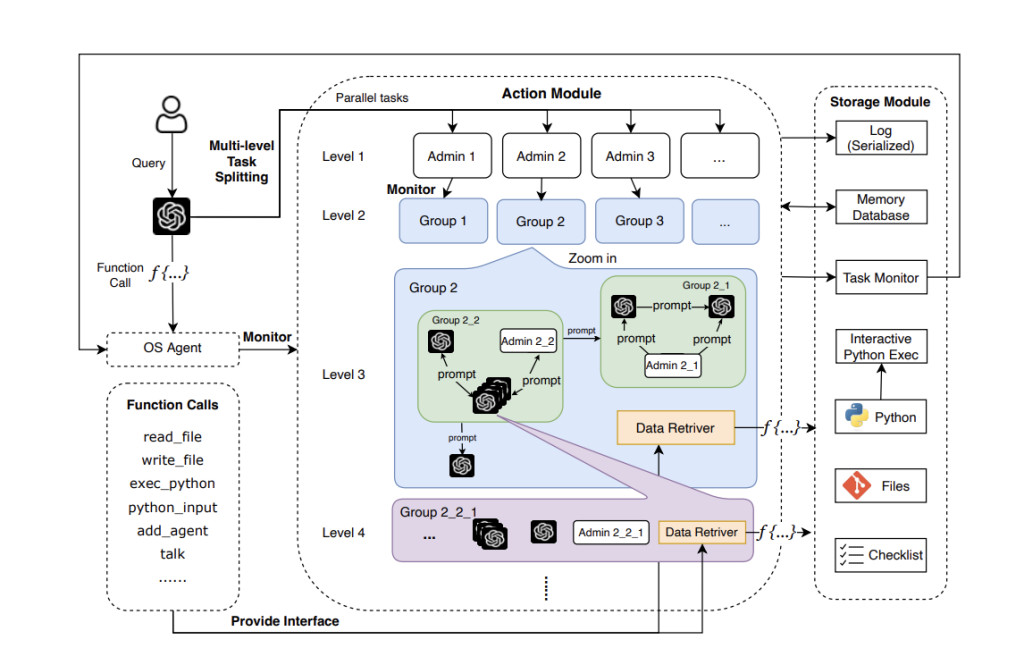Large Language Models (LLMs) have advanced rapidly, becoming powerful tools for complex planning and cognitive tasks. This progress has spurred the development of LLM-powered multi-agent systems (LLM-MA systems), which aim to simulate and solve real-world problems through coordinated agent cooperation. These systems can be applied to various scenarios, from software development simulations to analyzing social behaviors. However, the growing complexity of tasks has revealed significant challenges, particularly in scaling these systems to manage many agents while maintaining autonomy and effective collaboration.
A critical issue in current LLM-MA systems is their dependence on predefined Standard Operating Procedures (SOPs), which restrict flexibility and adaptability. Most frameworks today are designed with fixed procedures, limiting the ability of agents to respond dynamically to new tasks. This rigidity hampers the effectiveness of LLM-MA systems, especially when dealing with large-scale, multidisciplinary challenges that require creative problem-solving and efficient coordination among many agents. The need for robust mechanisms for agent cooperation further diminishes the potential of these systems to operate effectively in more complex environments.
Most LLM-MA systems are constrained by their linear execution models and limited scalability. These systems typically involve a small number of agents working sequentially, which restricts their ability to handle tasks that require simultaneous processing and interaction among many agents. For example, models like MetaGPT and AutoGen rely on a sequential pipeline where agents follow a fixed trajectory, significantly limiting their performance as the number of agents increases. These systems often need more infrastructure to manage and coordinate multiple agents working on different aspects of a task concurrently, leading to inefficiencies and delays in task completion.
Researchers from the National University of Singapore, Shanghai Jiao Tong University, the University of California, Berkeley, and the South China University of Technology introduced MegaAgent—a framework designed to revolutionize LLM-MA systems by enhancing their autonomy and scalability. MegaAgent distinguishes itself by enabling dynamic task splitting and parallel execution among agents, a significant departure from the traditional sequential models. This framework operates without predefined SOPs, allowing it to adapt to the needs of each task and manage a much larger number of agents effectively. By introducing system-level parallelism, MegaAgent facilitates real-time communication and coordination among agents, ensuring that even complex tasks are completed efficiently.
MegaAgent’s architecture is built around a hierarchical structure that divides tasks into smaller sub-tasks, each managed by different agent groups. The framework employs a ‘boss’ agent responsible for receiving the main task, dividing it into sub-tasks, and assigning these to ‘admin’ agents. These admin agents then generate groups of agents to complete the sub-tasks, ensuring that each task is handled with a high degree of specialization. This multi-level approach allows MegaAgent to operate in parallel, significantly reducing the time required to complete tasks. For instance, in one experiment, MegaAgent successfully generated and coordinated 590 agents within 3000 seconds to simulate national policy development, a feat unmatched by other existing models.
In terms of performance, MegaAgent has demonstrated remarkable efficiency and autonomy through various experiments. One notable experiment involved developing a Gobang game, where MegaAgent outperformed other LLM-MA systems by completing the task in just 800 seconds using seven agents. This significantly improved over competing models like AutoGen and MetaGPT, which either failed to complete the task or produced incomplete and non-functional outputs. MegaAgent’s ability to manage and scale up to 590 agents in the national policy simulation underscores its superior scalability, as other models struggled to coordinate even a fraction of that number. The system’s hierarchical and parallel execution capabilities allowed it to achieve these results while maintaining high levels of accuracy and efficiency.
MegaAgent’s success in these experiments highlights its potential as a foundational framework for future LLM-MA systems. MegaAgent paves the way for more advanced and capable multi-agent systems tackling even more complex and large-scale tasks. The framework’s ability to dynamically adapt to the specific requirements of each task, coupled with its efficient parallel execution, makes it a promising tool for various applications, from strategic simulations to large-scale policy development. The researchers believe that MegaAgent’s approach could serve as a blueprint for the next generation of LLM-MA systems, enabling them to operate with greater autonomy and effectiveness across various domains.
In conclusion, MegaAgent addresses current frameworks’ limitations by offering a scalable, autonomous solution for managing large-scale agent cooperation. Through innovative hierarchical task splitting and parallel execution, MegaAgent has demonstrated its ability to outperform existing models, completing complex tasks with unprecedented efficiency. As the demands on LLM-MA systems continue to grow, MegaAgent’s framework provides a robust foundation for future developments, ensuring that these systems can meet the challenges of increasingly complex and large-scale applications. The researchers’ successful experiments with up to 590 agents illustrate the framework’s potential to revolutionize how LLMs are applied in real-world scenarios, paving the way for more sophisticated and effective multi-agent systems.
Check out the Paper and Code. All credit for this research goes to the researchers of this project. Also, don’t forget to follow us on Twitter and join our Telegram Channel and LinkedIn Group. If you like our work, you will love our newsletter..
Don’t Forget to join our 48k+ ML SubReddit
Find Upcoming AI Webinars here
The post MegaAgent: A Practical AI Framework Designed for Autonomous Cooperation in Large-Scale LLM Agent Systems appeared first on MarkTechPost.
Source: Read MoreÂ


